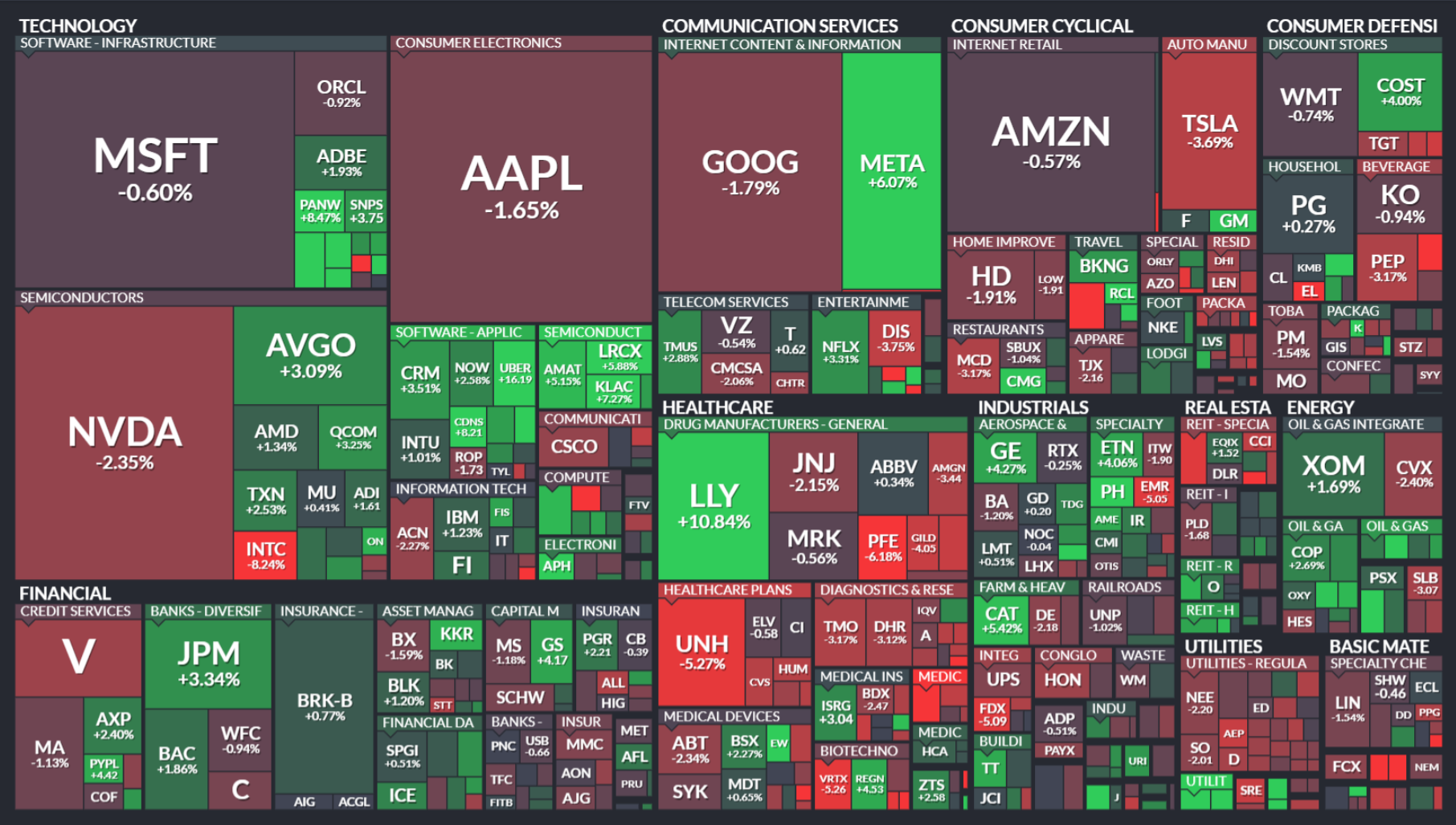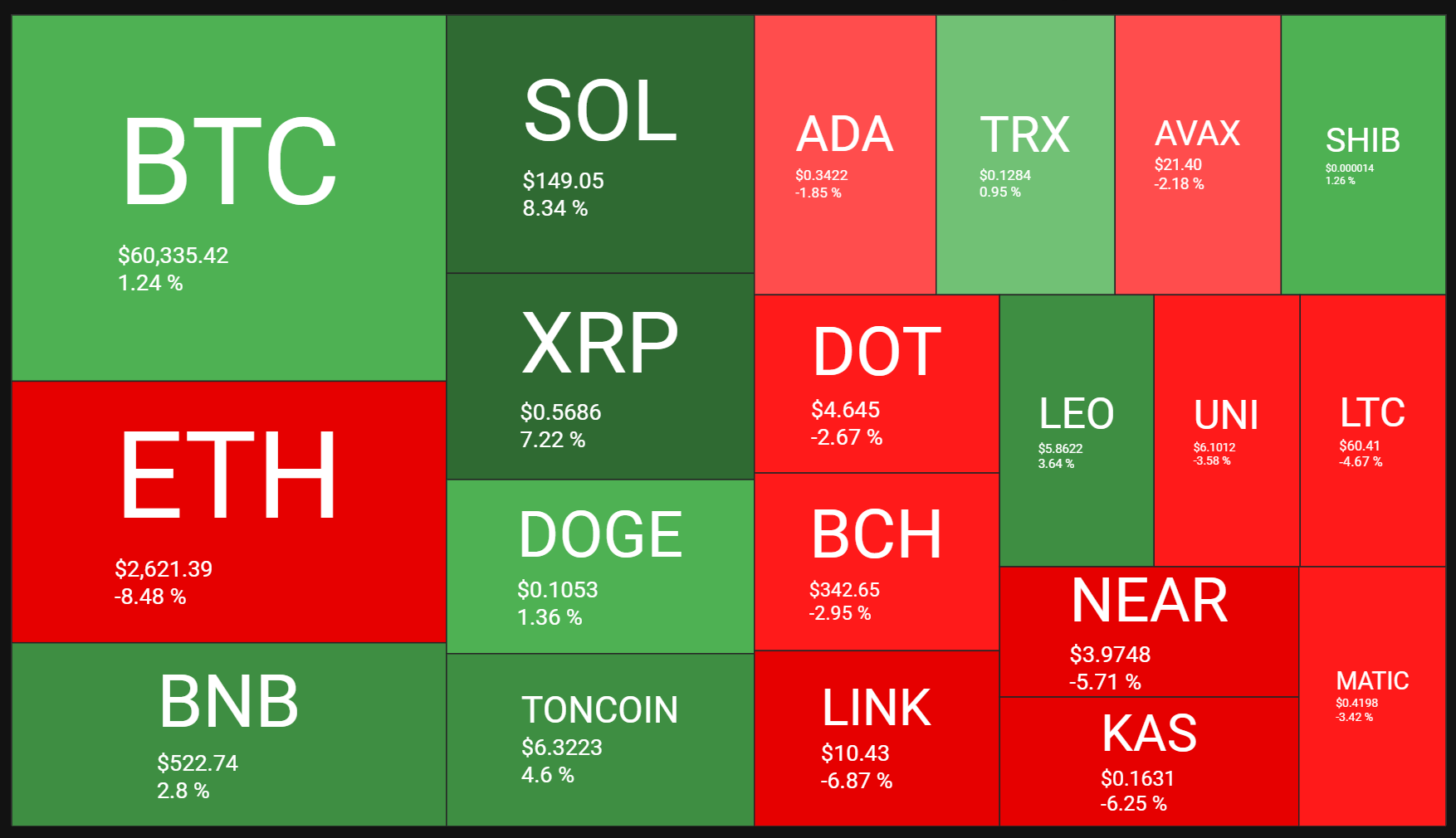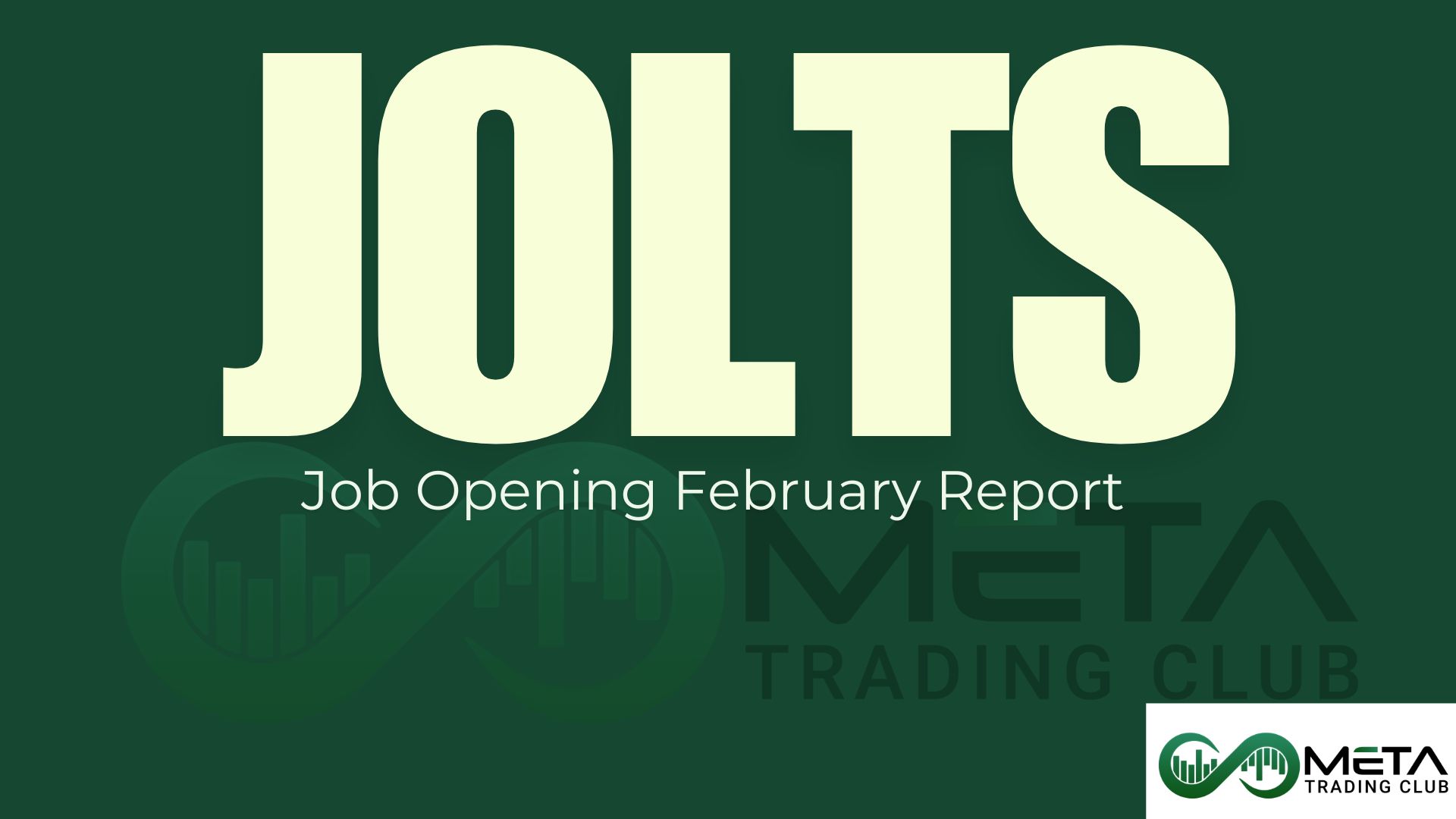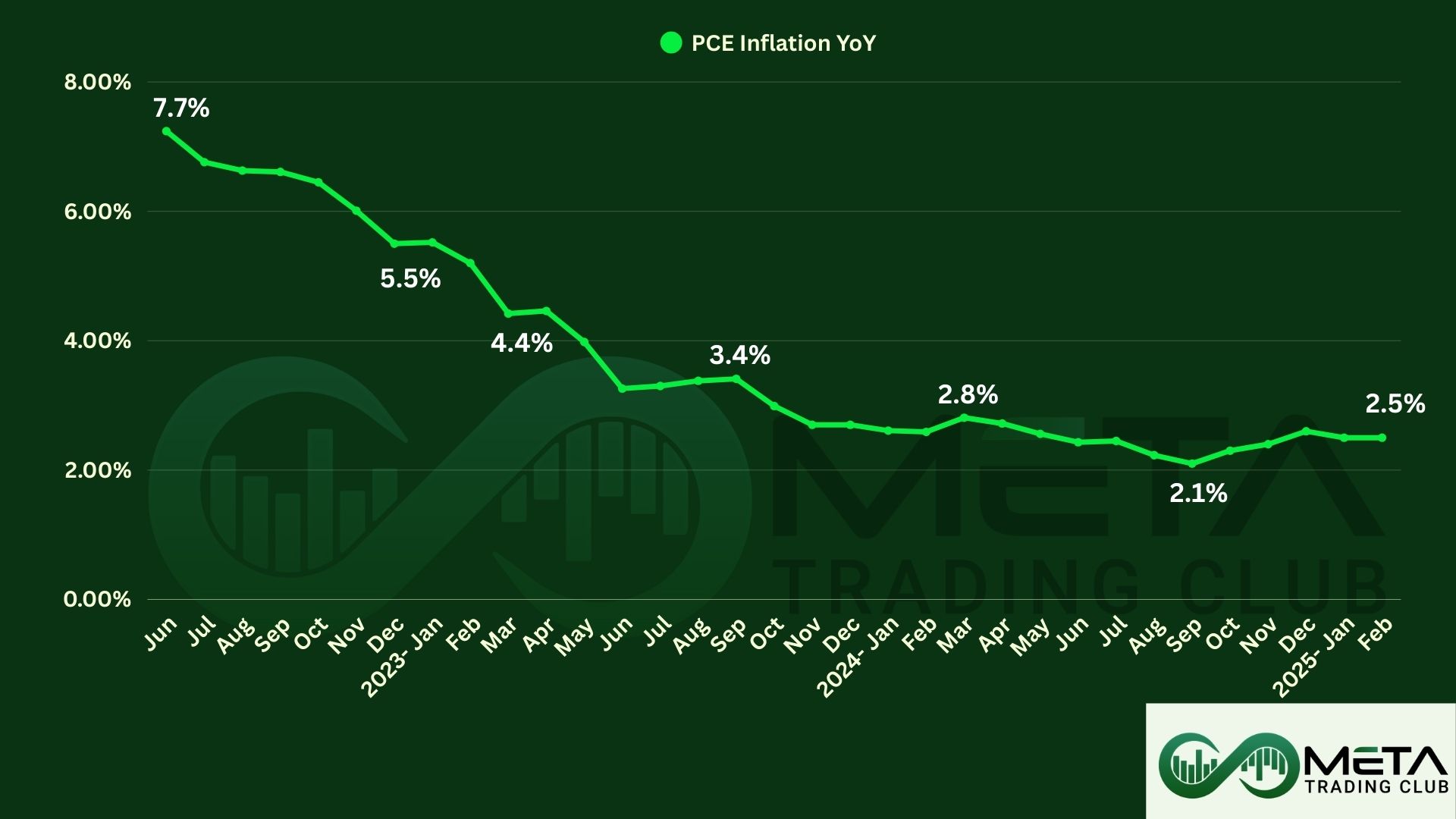Last week’s market and economic data key points:
- Market comeback after huge drop on Monday
- Stocks extend gains after sell-off amid positive data, Fed’s rate signals
- UBER posts Q2 revenue $10.7B
- Eli Lilly upbeat revenue outlook after good reports
- Apple used Google’s chips to train its AI
- Uber tend to use Tesla’s self driving cars
- ISM Services PMI rebounds more than expected
- China’s inflation rate hits 5-month peak
- The Swiss unemployment rate stood at 2.3%
- The unemployment rate in Canada was 6.4% in July
- US 30-year mortgage rate plunges to last year low
- Bitcoin bounces back above $60,000 level
Table of Contents
Last Week’s Reports
Economic Reports
The S&P Global US Services PMI was revised lower to 55 in July. Showed expansion in the services sector, although the rate of growth eased slightly.
New business rose for the third consecutive month and at a solid pace and increased for the first time in six months. Growth of new business also encouraged firms to take on extra staff. Meanwhile, the rate of input cost inflation quickened, but companies increased their selling prices at a softer pace amid competitive pressures.
Exports of goods and services from the United States rose 1.5%, the highest since a record level hit in February.
The Economic Optimism Index in the US increased by 0.7% in August (the highest in seven months). The Six-Month Economic Outlook, which measures how consumers perceive the economy’s prospects in the next six months, improved to 43.4 in August. On the other hand, the Personal Financial Outlook which measures how Americans feel about their own finances in the next six months, declined by 0.2%
The initial jobless claim in the US fell to 230K. Despite this decline, the claim count remained significantly above this year’s average, as the US labor market has softened since its post-pandemic peak, although it remains historically tight. In the meantime, the continuous jobless claim count increased to 1,875K (the highest since November 2021).
The average rate for a 30-year fixed mortgage plunged to 6.47% (their lowest level in over a year). This decline occurred alongside Treasury yields dropping to one-year lows, as heightened fears of a U.S. recession fueled a flight to safety and spurred risk-off sentiment in the market. The drop in mortgage rates increases prospective homebuyers’ purchasing power and should stimulate interest in making a move. Additionally, this decline in rates is providing some existing homeowners the opportunity to refinance.
Earning Reports
Uber
Uber‘s sixth consecutive quarter of trip growth above 20 percent, alongside record profitability. “The Uber consumer has never been stronger (more people are using the platform) and more frequently than ever before, ” said Dara Khosrowshahi, CEO.
Revenue grew 16% YoY to $10.7 billion. Combined Mobility and Delivery revenue grew 19% YoY to $9.4 billion.
Airbnb
Airbnb‘s Q2 earnings performance was tough due to slower demand and increased marketing expenses.
The company on Tuesday posted Q2 earnings of $0.86 per share on revenue of $2.75 billion. The company is facing a textbook multiple compression situation driven by higher marketing spend into slowing demand. Airbnb shares were down by nearly 13% after earning.
Airbnb has signaled a potential decrease in demand among U.S. consumers in the current quarter. The company projects an 8% to 10% rise in third-quarter revenue, but also expects a sequential slowdown in the number of nights and experiences booked, especially from U.S. guests.
Disney
Walt Disney’s revenues for the quarter increased to $23.2 billion from $22.3 billion.
The company achieved strong double-digit percentage growth of 19% for total segment operating income and 35% for adjusted EPS.
Entertainment segment operating income nearly tripled year over year in Q3, due to significantly improved results at Direct-to-Consumer and Content Sales/Licensing and Other.
Lilly
Revenue in Q2 2024 increased 36%. 2024 full-year revenue guidance raised by $3 billion. Also, Lilly’s earing upbeat estimate to $3.92 per share.
“We recently received approval of Kisunla to help people with Alzheimer’s disease, a moment that was decades in the making“, David A. Ricks, Lilly’s chair and CEO.
Lilly’s share gained 10% in this week and as you see, it had a steady rise within a year ago.
U.S. Election
Republican presidential candidate Donald Trump on Thursday offered the most explicit indication so far of his interest in infringing on the Federal Reserve‘s independence should he regain the White House.
“I feel the president should have at least a say on Fed decisions”, the former president told reporters in Florida.
Also, Trump revisited his remarks about Fed chair Powell, saying “I fought him very hard.” Fed Chair Jerome Powell, whom he installed as central bank chief in 2018 and was reappointed by President Joe Biden and doesn’t expire until May 2026.
The next president will also have a chance to choose the two Fed vice chairs – one for monetary policy and one for banking supervision.
U.S. Vice President Kamala Harris said on Saturday the Federal Reserve is independent and she will never interfere in its decisions if she wins the Nov. 5 presidential election.
“The Fed is an independent entity and as president I would never interfere in the decisions that the Fed makes,” Harris told reporters in Phoenix, Arizona.
Harris, who officially became the Democratic Party’s presidential nominee earlier, said she planned to unveil her policy positions next week, with a focus on the U.S. economy.
“It’ll be focused on the economy and what we need to do to bring down costs, and also strengthen the economy overall,” she said.
Indices
Indices’ Weekly Performance:
U.S. stocks settled lower on Monday, with the Dow Jones index tumbling over 1,000 points during the session to record its worst day in around two years.
Intraday Monday, the Nasdaq was down more than 1,000, and the CBOE’s Volatility Index (VIX), known as the fear gauge, was surging 80% as pricing of interest-rate cuts in September and beyond fanned concerns a recession is lurking.
The CNN Money Fear and Greed index showed a further decline in the overall market sentiment, with the index moving to the “Extreme Fear” zone on Monday.
For the week, the Dow Jones fell 0.6%, while the S&P 500 was little changed.
Another leap higher Friday means that the index has now filled the gap down from Monday. This bullish development puts the S&P 500 on course for more gains, towards 5400 and then 5560 from late July. Sellers will need a reversal back below 5200 to negate the bullish outlook.
Stocks
Stock Market Sector’s Weekly Performance:
Source: Finviz
Stock Market Weekly Performance:
Source: Finviz
Wall Street was occupied earlier last week with the possibility of an interim rate cut before the Fed’s Sept. 17-18 policy meeting. Labor market’s data makes such a dramatic move. The report concerns that the Fed has already kept rates too high for too long, sowing the seeds of a recession. But stocks rebound after that huge selloff.
Akamai Technologies (AKAM) shares jumped nearly 11%, the best performer on the S&P 500. Late Thursday, the company raised its full-year earnings outlook after its second-quarter financial results topped Wall Street’s views.
Intel (INTC) saw the biggest drop on the Dow and was the second-worst performer on the S&P 500 and the Nasdaq, down 8% last week.
Apple used Google’s chips to train its AI. It could have used its own chips, conducted training via cloud infrastructure, or gone the popular route and just bought billions of dollars’ worth of Nvidia chips. Instead, it made a deal with the company that owns Google.
Apple has been accused of being late to the artificial intelligence party. While its peers were busy pivoting to generative AI and pouring billions of dollars into training chips and cloud services. This led investors to worry over whether the house that Steve Jobs built was falling behind its closest competitors.
Uber will use and benefit from self-driving cars too. It has the user base and network to plug autonomous vehicles. That could be Tesla, Alphabet’s Waymo, or General Motors’ Cruise. Uber didn’t immediately respond to a request for comment about which global AV players it was referring to.
A Tesla-Uber partnership would likely boost Tesla stock. It would validate Elon Musk’s strategy of investing heavily in self-driving tech. Tesla hosts its robotaxi event in October to show off the progress it’s making in teaching cars to drive themselves.
Tesla’s share has a downward momentum although it reaches a Fibonacci supporting level.
Commodity
Weekly Performance of Gold, Silver, WTI and Brent Oil:
Source: Finviz
Gold prices are inching upward, recovering about half of Monday’s losses, as tensions escalate over potential Iranian retaliation against Israel. Following the death of Hamas leader Ismail Haniyeh last week, Iran has openly vowed retribution, stoking concerns of an imminent attack. This development has intensified fears of a broader conflict in the Middle East, driving investors towards the safe-haven asset. Global conflicts and political instability often increase gold demand as governments and individuals seek to protect their wealth.
Gold remains within a well-defined multi-month range with the precious metal testing, and briefly breaking, resistance before falling back. The short-term outlook remains mixed with the 50-day Moving Average proving support. The multi-month series of higher lows remains in place, while a break above $2,485/oz. is needed to keep a series of higher highs in place. But firstly, gold needs to break the RSI downward trendline which shows a slowing momentum in gold.
The precious metal has been drifting sideways to marginally higher since early April with two breaks of resistance ($2,450/oz.) quickly reversed. Gold seems to be setting up for another attempt at this level and if successful the all-time high at $2,485/oz. will be quickly tested.
Forex
Weekly Performance of Major Foreign Exchange Pairs:
USD/CHF: The Swiss unemployment rate stood at a non-seasonally adjusted 2.3% in July (unchanged from the previous three months). Also, Retail sales in Switzerland unexpectedly fell 2.2 percent YoY in June. It marked the second straight month of contraction in retail sales and the steepest decline since September 2023, due to drops in trade of food products.
USD/CAD: The S&P Global Canada Services PMI fell to 47.3 in July, indicating continued contraction in Canada’s services economy for the second consecutive month, although the pace of decline eased. Both activity and new business volumes experienced reductions, with only the Finance & Insurance sector showing growth.
The unemployment rate in Canada was 6.4% in July (remaining unchanged from the January 2022-high). The result still suggested that Canada’s labor market continued to show the softening.
Crypto
Crypto Market Weekly Performance:
Source: quantifycrypto
Bitcoin has recovered all this week’s losses and is back at levels seen just before Non Farm Payrolls release sent risk markets tumbling on US recession fears. Over this week these worries have been dialed back and risk markets, including Bitcoin, have made a strong recovery.
Printing a fresh lower low leaves the chart with a negative bias, while the 50- and 200-day simple moving averages are being tested but have held firm so far.
As you can see in the weekly time frame, RSI shows a downward momentum while the price consolidates in a triangle. So, BTC to overcome the bearish pressure, needs to break the RSI down-ward trendline in the first place. If BTC/USD can break above$70k, a cluster of prior highs, then it can complete a flag pattern and the price may surge significantly.
Next Week’s Outlook
Economic Events
In the US, all eyes will be on inflation data and speeches by several Fed officials. The CPI report is expected to show a slight deceleration in the annual inflation rate to 2.9% and a slowdown in the core rate to 3.2%.
Meanwhile, the PPI likely increased at a slower 0.1%.
At the same time, retail sales are expected to rise 0.3%, rebounding from a flat reading in June. Also, industrial production is expected to rise 0.1%.
Other key data releases to keep an eye on include housing starts, building permits, preliminary figures for the Michigan consumer sentiment and consumer inflation expectations.
Earning Events

Disclaimer: The views and opinions expressed in the blog posts on this website are those of the respective authors and do not necessarily reflect the official policy or position of Meta Trading Club Inc. The content provided in these blog posts is for informational purposes only and should not be considered as financial advice. Readers are encouraged to conduct their own research and consult with a qualified financial advisor before making any investment decisions. Meta Trading Club Inc shall not be held liable for any losses or damages arising from the use of information presented in the blog posts.






























